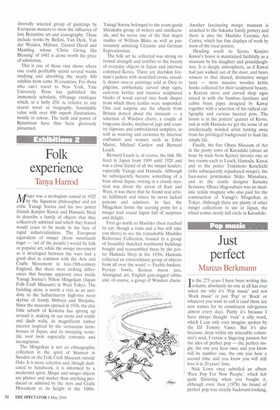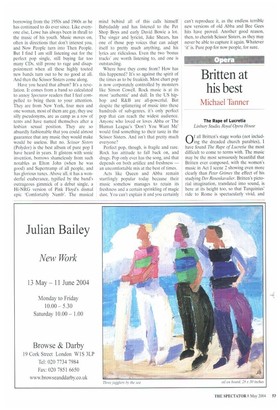Just Perfect
Marcus Berkmann
In the 273 years I have been writing this column, absolutely no one at all has ever asked me why it's 'Pop music' and not 'Rock music' or just 'Pop' or 'Rock' or whatever you want to call it (and there are new names for its constituent sub-genres almost every day). Partly it's because I have always thought 'rock' a silly word, which I can only ever imagine spoken by the DJ Tommy Vance. But it's also because, deep within my miserable columnist's soul, I retain a lingering passion for the idea of perfect pop — the perfect single, the one you hear once and you know will be number one, the one you hear a second time and you know you will still love it in 20 years' time.
Nick Lowe once subtitled an album 'Pure Pop For Now People', which felt quite flattering when you bought it, although even then (1978) his brand of perfect pop was strictly backward-looking, borrowing from the 1950s and 1960s as he has continued to do ever since. Like everyone else, Lowe has always been in thrall to the music of his youth. Music moves on, often in directions that don't interest you, and Now People turn into Then People. But I find I am still listening out for the perfect pop single, still buying far too many CDs, still prone to rage and disappointment when all these highly touted new bands turn out to be no good at all. And then the Scissor Sisters come along.
Have you heard that album? It's a revelation. It comes from a band so calculated to annoy Spectator readers that I feel compelled to bring them to your attention. They are from New York, four men and one woman, most of them are gay, they use silly pseudonyms, are as camp as a row of tents and have named themselves after a lesbian sexual position. They are so absurdly fashionable that you could almost guarantee that any music they would make would be useless. But no. Scissor Sisters (Polydor) is the best album of pure pop I have heard in years. It glistens with sonic invention, borrows shamelessly from such notables as Elton John (when he was good) and Supertramp of all people, and has glorious tunes. Above all, it has a wonderful exuberance, typified by the band's outrageous gimmick of a debut single, a Hi-NRG version of Pink Floyd's dismal epic 'Comfortably Numb'. The musical mind behind all of this calls himself Babydaddy and has listened to the Pet Shop Boys and early David Bowie a lot. The singer and lyricist, Jake Shears, has one of those pop voices that can adapt itself to pretty much anything, and his lyrics are ridiculous. Even the two 'bonus tracks' are worth listening to, and one is outstanding.
Where have they come from? How has this happened? It's so against the spirit of the times as to be freakish. Most chart pop is now corporately controlled by monsters like Simon Cowell. Rock music is at its most 'authentic' and dull. In the US hiphop and R&B are all-powerful. But despite the splintering of music into these hundreds of sub-genres, it's only perfect pop that can reach the widest audience. Anyone who loved or loves Abba or The Human League's 'Don't You Want Me' would find something to their taste in the Scissor Sisters. And isn't that pretty much everyone?
Perfect pop, though, is fragile and rare. Rock has attitude to fall back on, and drugs. Pop only ever has the song, and that depends on both artifice and freshness — an uncomfortable mix at the best of times.
Acts like Queen and Abba remain startlingly popular today because their music somehow manages to retain its freshness and a certain sprinkling of magic dust. You can't explain it and you certainly can't reproduce it, as the endless terrible new versions of old Abba and Bee Gees hits have proved. Another good reason, then, to cherish Scissor Sisters, as they may never be able to capture it again. Whatever 'it' is. Pure pop for now people, for sure.













































































 Previous page
Previous page